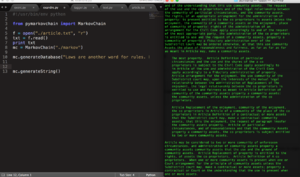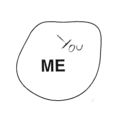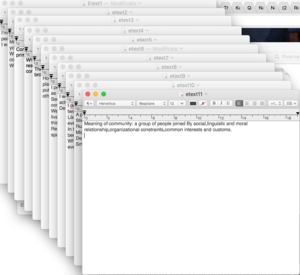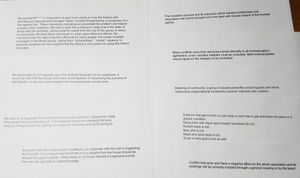Presentation 2nd Trimester: Difference between revisions
(→Future) |
|||
| (6 intermediate revisions by the same user not shown) | |||
| Line 27: | Line 27: | ||
*The Temporary Autonomous Bureau Project [https://aa.xpub.nl/index.php?title=The_Temporary_Autonomous_Bureau , Wiki T.A.B. on Autonomous Archive] | *The Temporary Autonomous Bureau Project [https://aa.xpub.nl/index.php?title=The_Temporary_Autonomous_Bureau , Wiki T.A.B. on Autonomous Archive] | ||
Research on the meaning of autonomy (or self-organisation) considering existing projects in Rotterdam, | |||
Using the platform of the Poortgebouw and the Autonomous Archive as starting point, | |||
The three months research aims to map and explore if self-organisation is still possible within the institutionalised constraints of the city. | |||
Interest in finding evidence in existing self-organised (or co-organised) cultural and living space in the city of Rotterdam, | Interest in finding evidence in existing self-organised (or co-organised) cultural and living space in the city of Rotterdam, | ||
Exporation of forms of questionnaires and diagrams for the engagement of the public in the topic. | Exporation of forms of questionnaires and diagrams for the engagement of the public in the topic. | ||
Next Actions: | |||
*Open Talk with Stad in De Maak (& others to confirm): on co-housing projects in Rotterdam. How to claim space while respecting the law. | |||
*Workshop on banner making: the workshop will explore scripts for the generation of automatic slogans to paint on banners. The source-text comes from the recording of the talks. The banners will be placed on the building of the people that were involved in the project and helped us. | |||
*Final Publication and Manifesto: we're working on producing a small reader with the texts of the talks and conversations we had in the space. We're also planning in writing a manifesto, as text that answer the question: ''Is Autonomy even possible for individuals and cultural projects in the city of Rotterdam?'' | |||
<gallery> | <gallery> | ||
| Line 45: | Line 59: | ||
[[File:Schermata 2018-03-25 alle 20.14.02.png| thumb| right| 300 px| selecting texts from PG archive]] | [[File:Schermata 2018-03-25 alle 20.14.02.png| thumb| right| 300 px| selecting texts from PG archive]] | ||
[[File:Record.jpg| thumb| right| 300 px| ]] | [[File:Record.jpg| thumb| right| 300 px| ]] | ||
Working on a workshop / theatre piece about negotiating together the terms of the plot and the end of the stories. | Working on a workshop / small theatre piece about negotiating together the terms of the plot and the end of the stories. | ||
The actors have multiple options in completing their scripts. | The actors have multiple options in completing their scripts. | ||
The actors chooses directions from the options of the scripts and tries to act it out in the scene. | The actors chooses directions from the options of the scripts and tries to act it out in the scene. | ||
| Line 54: | Line 68: | ||
I tried to make a little sample of source-text, trying to select only few parts of conversations and dividing them by themes and type. | I tried to make a little sample of source-text, trying to select only few parts of conversations and dividing them by themes and type. | ||
I made a list of topics which could constitute a list of themes to explore in a play: ESTABLISHING COMMON RULES: ORGANISE OUR SELVES, REFUSE TO CO-OPERATE: NOT RESPECTING THE RULES, ASKING / SEEKING FOR SUPPORT: STRATEGIES FOR COLLABORATION, INTERPRETING THE OTHER: LOOPS IN THE COMMUNICATION. | I made a list of topics which could constitute a list of themes to explore in a play: ESTABLISHING COMMON RULES: ORGANISE OUR SELVES, REFUSE TO CO-OPERATE: NOT RESPECTING THE RULES, ASKING / SEEKING FOR SUPPORT: STRATEGIES FOR COLLABORATION, INTERPRETING THE OTHER: LOOPS IN THE COMMUNICATION. | ||
In every chapter there | In every chapter there will be a series of scripts to be re-mixed and read. The texts I used as example of source materials are divided in: RULE, FACT / EPISODE, OPINION. | ||
I'm interested in building a conversation between fragments of those statements / rules / opinions, and the reader / the actor which read, interprets and transmits the text and produces another sentence. | I'm interested in building a conversation between fragments of those statements / rules / opinions, and the reader / the actor which read, interprets and transmits the text and produces another sentence. | ||
| Line 60: | Line 74: | ||
This to reflect collectively on the possibilities that the re-configuration of recorded text (which forms and inform what the community of the PG is) have in feeding the collective wisdom of a place. | This to reflect collectively on the possibilities that the re-configuration of recorded text (which forms and inform what the community of the PG is) have in feeding the collective wisdom of a place. | ||
What is the impact and which performance generates the transmission of the situated knowledge of a community? | What is the impact and which performance generates the transmission of the situated knowledge of a community? | ||
In alternative, if I manage to create a system that works, the source texts could be the recordings of the talks within the context of the Temporary Autonomous Bureau | |||
Until now I tried to understand: | Until now I tried to understand: | ||
| Line 78: | Line 94: | ||
*Adelita Husni Bey ''White Paper, The Law'' [http://www.gallerialaveronica.it/artworks/adelita-husni-bey-237-white-paper-the-law/ Convention on the use of space] | *Adelita Husni Bey ''White Paper, The Law'' [http://www.gallerialaveronica.it/artworks/adelita-husni-bey-237-white-paper-the-law/ Convention on the use of space] | ||
*Rimini Protocol [http://www.rimini-protokoll.de/website/en/projects, website of the theatre collective] | |||
Latest revision as of 10:29, 9 April 2018
Research
Which are the questions and the focus of my research?
- Understanding community relationships: and reconsidering the value of being together, focus on empathy, needs and responsibilities,
- My urgency is the necessity of considering practices of collaboration as hard work to do together through long term and face-to face relationships while balancing collectively needs and responsibilities,
- Relationships in communities requires patience and practice,
- Co-operation is a practice that ask to look at responsibilities toward others and needs of community,
- Which directions are there to help us building communities? (the law, institutions, the net..)
- How can we build within those pre-defined directions, spaces for sociality, diversity, empathy and relationships founded on mutual trust?
- Co-operation as both a practice of unknown results and a ritual of committment
- Contemporary scarcity of face to face relationships,
- Which existent practices do I know that challenges parameters of being together?
- How do we transmit the rituals of being together?
- How do we negotiate the terms of our being together?
- How rules regulates needs and responsibilities of individuals in community?
- How art, research and educational projects can generates conversations on the complex relationship between individual agency and community existence?
Prototypes
What did I do until now?
- Small research on games and law making processes Graduation Proposal
Interest in playing with the texts of various regulations,
Interest in Nomic card games,
- The Temporary Autonomous Bureau Project , Wiki T.A.B. on Autonomous Archive
Research on the meaning of autonomy (or self-organisation) considering existing projects in Rotterdam,
Using the platform of the Poortgebouw and the Autonomous Archive as starting point,
The three months research aims to map and explore if self-organisation is still possible within the institutionalised constraints of the city.
Interest in finding evidence in existing self-organised (or co-organised) cultural and living space in the city of Rotterdam,
Exporation of forms of questionnaires and diagrams for the engagement of the public in the topic.
Next Actions:
- Open Talk with Stad in De Maak (& others to confirm): on co-housing projects in Rotterdam. How to claim space while respecting the law.
- Workshop on banner making: the workshop will explore scripts for the generation of automatic slogans to paint on banners. The source-text comes from the recording of the talks. The banners will be placed on the building of the people that were involved in the project and helped us.
- Final Publication and Manifesto: we're working on producing a small reader with the texts of the talks and conversations we had in the space. We're also planning in writing a manifesto, as text that answer the question: Is Autonomy even possible for individuals and cultural projects in the city of Rotterdam?
Future
Working on a workshop / small theatre piece about negotiating together the terms of the plot and the end of the stories. The actors have multiple options in completing their scripts. The actors chooses directions from the options of the scripts and tries to act it out in the scene. The chapters of the plot are inspired by existing situations recorded by the Autonomous Archive’s documents from the Poortgebouw. The process of generation of the scripts plays with multiple constraints and sets of possibilities (like Oulipian poetry )
The idea is to keep working with the materials of the archive, but to use texts from meetings, email conversations, written and unwritten rules as source text for the generator. I tried to make a little sample of source-text, trying to select only few parts of conversations and dividing them by themes and type. I made a list of topics which could constitute a list of themes to explore in a play: ESTABLISHING COMMON RULES: ORGANISE OUR SELVES, REFUSE TO CO-OPERATE: NOT RESPECTING THE RULES, ASKING / SEEKING FOR SUPPORT: STRATEGIES FOR COLLABORATION, INTERPRETING THE OTHER: LOOPS IN THE COMMUNICATION. In every chapter there will be a series of scripts to be re-mixed and read. The texts I used as example of source materials are divided in: RULE, FACT / EPISODE, OPINION.
I'm interested in building a conversation between fragments of those statements / rules / opinions, and the reader / the actor which read, interprets and transmits the text and produces another sentence.
This to reflect collectively on the possibilities that the re-configuration of recorded text (which forms and inform what the community of the PG is) have in feeding the collective wisdom of a place. What is the impact and which performance generates the transmission of the situated knowledge of a community?
In alternative, if I manage to create a system that works, the source texts could be the recordings of the talks within the context of the Temporary Autonomous Bureau
Until now I tried to understand:
- Oulipian poetry
- multiple choice narratives The Ambivalent Manifesto of Queueing Multiple Choice by Alejandro Zambra
- forms of questionnaires and diagrams
References:
- Miranda July, New Society: Trailer
Theatre piece which invite the public to participate in the journey of a temporary society created by actors and audience, She has an interest in finding out how hard it is to engage with the public, she makes the scripts but let people read them and interpret them as they like, the show contains moments of collective writing of amendments for their fictional government, moments of improvised sociality, and moments where everything breaks down in an unexpected end.
- 'Kajsa Dahlberg 'The Name Of This Association Shall Be Transmission links of the project [1]
"A platform for the 400 Transmission members, invited guests, or anyone who came across the gallery, to propose a change to the "OBJECTIVES" of the gallery’s constitution. These proposed changes would then be considered, discussed or discharged by the members of the committee and hopefully ultimately make it to the constitution by way of the Annual General Meeting (AGM)."
- Adelita Husni Bey White Paper, The Law Convention on the use of space
- Rimini Protocol website of the theatre collective











